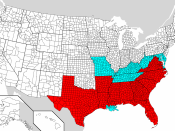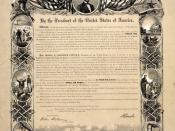Although some historians feel that the Civil War was a result of political blunders and that the issue of slavery did not cause the conflict, this interpretation fails to consider the two main causes of the war itself: the expansion of slavery and its entrance into the political scene. The Civil War (1861-1877) was a product of the diverging society between the North and the South, who had different goals.
Slavery and slave trades had become a big part of the South's economy. The slaves were needed to work on plantations, which helped the South prosper. During the 19th century, the North worked to abolish slavery -they believed it was a disgrace to the union. Several compromises were drafted, including the Missouri Compromise, which made Maine a free state and Missouri a slave state, and excluded slavery from the Louisiana Territory. Another important compromise was the Compromise of 1850, which admitted California as a free state and worked to abolish interstate slave trades.
Harriet Beecher Stowe's book, Uncle Tom's Cabin, reinforced the views of the North by illustrating the evils of slavery. Even with the compromises, works like Uncle Tom's Cabin rose the tension between the North and the South, who were far from settling on the issue of slavery. The existence of slave labor in the South made the Northern states the preferred destination for European immigrants, resulting in an increasing dominance of the North in Congress and Presidential elections, because of population size. During the early part of the war, Lincoln, to hold together his war coalition, emphasized preservation of the Union as the sole objective of the war, but with the Emancipation Proclamation, (announced in September 1862 and put into effect four months later) Lincoln adopted the abolition of slavery as a second mission,


